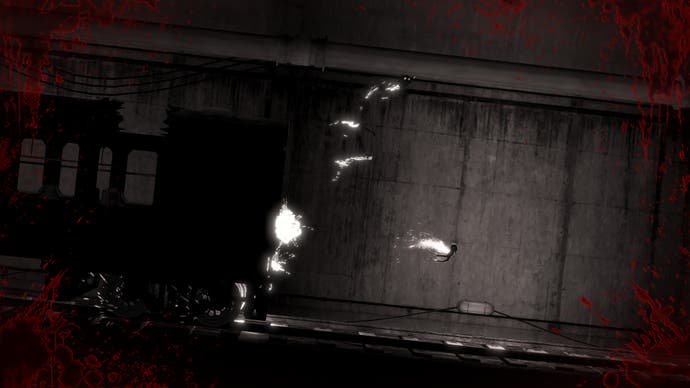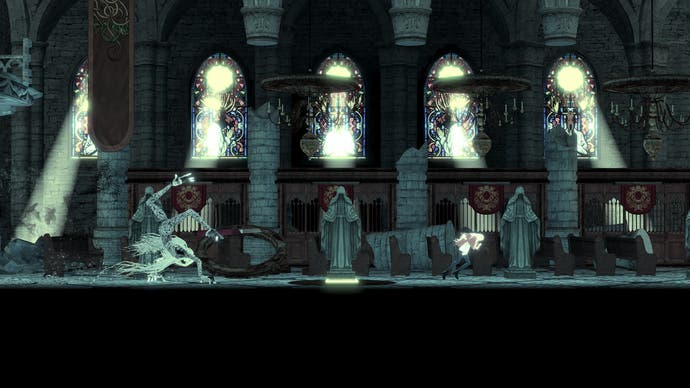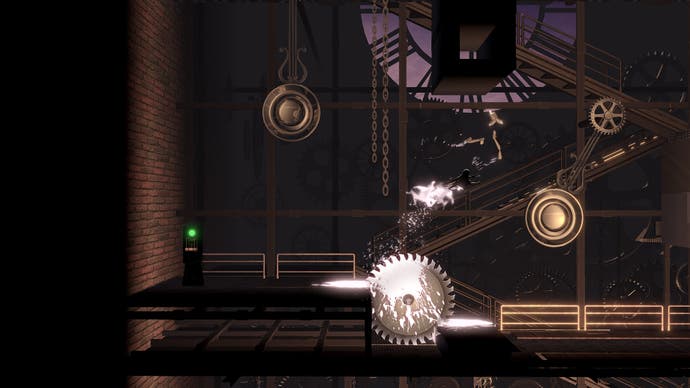The Missing review - clumsy platformer redeemed by its stunning design
Limb-go.
J.J.'s broken her neck again.
There's a horrible crunch when it happens. I'm still not used to it, not even now, not even when I'm several hours into my adventure with J.J. Macfield and most of the time, I'm snapping her neck intentionally. She screams each and every time the bones splinter, her wails of pain piercing the night as her head suddenly lolls to one side, her long, fair hair trailing with it.
Sometimes a severed limb will shoot up into the air, landing on a distant platform. Sometimes she must stack her dismembered appendages to balance a crude seesaw. Sometimes she's reduced to nothing more than a severed head, the screen pulsating with a sickly reminder that this is poor J.J.'s final form. Die now, and she'll die for good. Sometimes I wonder if she'd be better off for it.
The gleeful abandon in which we're continually forced to crack JJ's neck and sever her limbs has baked an uneasiness into the very core of The Missing: J.J. Macfield and the Island of Memories. On one hand, creator Hidetaka "Swery" Suehiro has fleshed out a character that feels achingly real - yes, in spite of the deliciously cheesy voice work - but on the other, we're forced to do horrifying things to this "real", relatable young woman. Swery's made me care about J.J., but also makes me habitually hurt her, too. It's a juxtaposition that I'm still not quite comfortable with, to be honest.

At first, there doesn't seem to be anything particularly remarkable about her. She's in college, but she worked hard to get there. She's loved, but her mother, it seems, is conservative and a little overbearing. As the story unfolds you'll learn how she interacts with her pals, her professors, and her family. You'll come to understand her favourite emojis and stickers, her college studies, and what her classmates think about her.
J.J.'s story, at least to begin with, is a simple tale of trying to locate her missing BFF, Emily. They go camping, the screen fades to black, and when J.J. awakes she's unexpectedly alone. It quickly becomes apparent that things aren't quite right here, though. Her favourite plushie is alive and texting her, there's a deer head in a doctor's coat - its mechanical voice inexplicably reciting numbers to her - and there is a selection of her favourite glazed doughnuts littered throughout the world. Emily's phone calls are a curious affair, as she chiefly talks to you in riddles and in a Twin Peaks-esque backwards voice. Oh, and J.J. can regenerate her limbs at will now.
It's a bizarre, bewildering game. While not quite invincible, J.J. is able to withstand all manner of tortuous dismemberments. By chopping her in half, for instance, she can balance her severed legs on one side of a seesaw and drag her shattered torso over to the other side and access an exit. By setting herself on fire, she can burn away barricading vines. Her flaming corpse can sometimes be used to conduct electricity, and if there's an out-of-reach collectable a dismembered arm can be chucked to dislodge it.

It's a clever, crafty little mechanic, though. By shrinking J.J. to just a head, she can squeeze through small spaces. By setting herself alight, she can light up dark rooms. While the puzzles are mostly mechanic and only latterly require a little timing and patience, they do, sadly, eventually outstay their welcome. There's an inevitable novelty to switching orientations and hanging out on the ceiling, for instance - not least because everything's backwards, and you're having to pursue an exit on the left-hand side of the screen now - but the feature is overused, as many are, and the initially horrifying sight of the life-sized mechanical monkeys is soon reduced to pin prickles of irritation rather than abject terror.
It'll take you through some beautiful backdrops, though, enough that you'll inevitably liken The Missing's striking visual style to similar 2D-platforming puzzlers like Limbo and Inside, which have each stamped their indelible mark upon the genre with their monochromatic palettes. There's little music, which means you're chiefly accompanied by J.J.'s wails of pain. By collecting the doughnuts secreted around the world (pro tip: there are many hidden areas, so be nosey if you're looking for the full set of 271), you'll receive seemingly historical text messages that contextualise J.J.'s study- and home-life, as well as pepper the story with brief but enjoyable vignettes about her friends, too. There's a lot of text-speak, stickers, and text emojis, but they're written so well - stuffed with palpable warmth and care - they feel anything but intrusive.
Your action button is also your randomly-call-out-loud button, which means J.J. will make plaintive cries to Emily when I'm just asking her to pick up a prop. There isn't a sizeable collection of those call-outs, either, which means you'll tire quickly of J.J.'s repetitive calls. Occasionally, the very puzzle mechanic I'm working with will trap me in a corner (yes, that's vague, but I'm trying not to spoil anything here). She's slow to move, especially - and probably unsurprisingly - when she's battered and broken, but whilst I understand why her ability to manoeuvre is inhibited by impairment, it's still a little frustrating to play. And getting her to turn around in a tight space is agonisingly slow.

The checkpoints could be a little kinder, too, particularly towards the end. A measly checkpoint will enforce a try-and-die approach many, many times over in the final sequence, which completely strips away the sizeable emotional charge that had been so carefully fostered until that point.
The story, though? That's where The Missing's heart lies. As wonky as the mechanics occasionally feel, the characterisations are tourniquet-tight, and the snappy, snarky texts authentic and relatable, even though you'll read a lot of them. While the plot twists likely won't blindside you, they're nevertheless painstakingly written, and the Missing's final gut-punch is powerful enough. Sometimes this careful tale feels at odds with The Missing's quirky delivery, but if I'm honest, it doesn't detract from it. I'm invested in both J.J. and Emily, and keen for the story's resolution... despite a gnawing sense of unease that it won't be a good one.
Essentially, though, The Missing is admirable in scope and story, and where it fails to outshine genre stalwarts like Inside, it makes up for those weaknesses with its quirky quintessential presentation, a likeable cast, and the intelligent trail of breadcrumb clues secreted throughout the six-ish hours of playtime.
But I remain uneasy that a coming-of-age tale - a story of identity, Living Your Best Life and accepting yourself and others - has essentially been scaffolded around self-mutilation. That its unsettling underlying message is that to progress through life, you must contort yourself into a range of horrifying positions, cutting yourself into pieces in order to conform. But even with those sizeable misgivings and 101 content warnings (expect explicit content, including extreme violence, sexual topics, and depictions of suicide), The Missing: J.J. Macfield and the Island of Memories is a brutal but beautiful tale that'll stay with you long after you lay down your controller.


